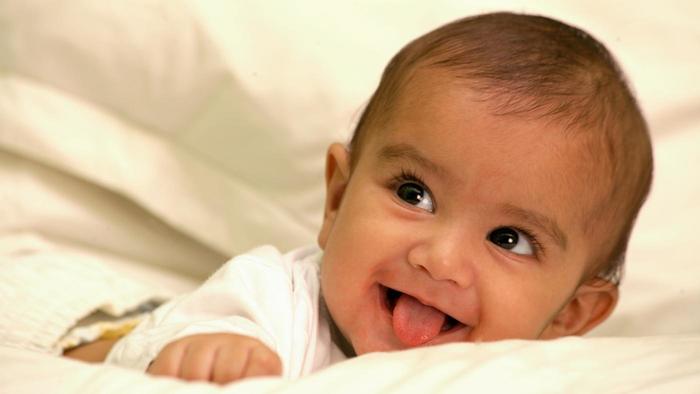Before babies are able to talk, they make use of a range of signals to communicate. Such signals include sticking out tongue, smiling, crying, scrunching nose and smacking lips. Though these signals are pretty common, they may mean different things in diverse situations. And some parents may be concerned about such an action if it continues for a period. In this article, we will discuss the various causes that lead a baby to stick out his tongue.

Is It Normal If a Baby Sticks Out His Tongue?
Typically, a baby sticking out tongue is not something of a big concern. If you do feel concerned about it, you can take your baby to a doctor. And if such an action is accompanied with difficulty in eating and drooling, it may indicate oral-motor disorder, referring that the baby has difficulties in controlling the muscles needed for swallowing. Closely monitor your baby and for any doubts, just seek help from a professional.
Causes of Baby Sticking Out Tongue
1. Prior to Eating and After Eating
At times, babies stick their tongue out to demonstrate their hunger. This is different to when they stick out their tongue when they feel full. When babies stick out tongue for eating, they also smack their lip meanwhile. Yet, when they feel full from bottle feeding, babies will stick out tongue with force and turn their head simultaneously with expressions to show that they aren't enjoying the food anymore.
2. During Playing
Babies really like to play along with their parents and the most common part of such games is when they imitate the facial expressions of their parents. At times, babies may take the initiative by sticking out their tongue and waiting for your similar response. Parents should play with their babies more often and notice if the baby imitates their actions, which can help to bond with the baby.
3. Feeding Changes
Though it is recommended for parents to introduce solid foods to their babies when they are 6 months old, some of the babies may demonstrate their unwillingness to accept solid food by sticking their tongues out. Also, with this natural instinct, the baby can be safe away from being choked.
4. Large Tongue (Macroglossia)
Macroglossia indicates an addition to the tissues present in the tongue. This results in the tongue sticking out from the mouth as it is not a suitable fit for a typical mouth. A large tongue can be either congenital or acquired. If you suspect this condition on your baby, seek for professional diagnosis timely.
5. Small Mouth
If a baby has a small mouth with a normal-sized tongue, it will give the impression of having a large tongue. A small mouth can be seen in children having Down syndrome, DiGeorge syndrome, and micrognathia. And the reason can be due to the difference within their palate.
6. Poor Muscle Tone (Hypotonia)
Poor muscle tone can lead to a completely relaxed sate of the tongue, making the baby sticking out tongue. Many syndromes including Down syndrome can lead to poor muscle tone.
7. Masses
The tongue can become larger or be pushed out by the growth or masses around and inside the tongue. Cysts can be formed in the salivary glands, which are commonly known as thyroglossal duct cyst. Usually, cysts are observed and resolve on their own.
8. Mouth Breathing
If a baby is a mouth breather, it is not strange to see the baby sticking out tongue. Typically, babies are nose breathers. So if they are breathing from their mouth, it is usually due to nasal congestion or large adenoids and tonsils. For the latter issues, the baby will require a surgery if sleep apnea and chronic sinus or ear infections associates.
9. Gas Pain
If your baby is pulling out his tongue and then pulling it back just like a snake, it probably means that he is experiencing gas pain.
10. What Do Other People Say?
This happens when baby is teething:
"My grandson, 8 months of age, sticks out his tongue all the time! He's teething again, and crazily drooling, and often leaves his tongue coming out of the mouth. This is actually cute. Though I am still not sure if this is interlinked to teething or not – what I do know now is that it is indeed a normal action done by babies. He does this more when he is feeling happy instead of when he is feeling irritable from teething. Babies start getting their teeth at the age of 3 months. My daughter got 2 teeth at the age of 4 months, and her son now is not really far behind that."
Some parents experinece another situation:
"Recently, I got the tongue of my son checked by pediatric ENT, as it is so often sticking out that the pediatrician got worried that maybe the tongue is too large for his mouth. However, it turned out that my son's tongue is completely normal. It was assured by the ENT that babies just make use of their tongues so that they can explore the world. He even does it while concentrating. Babies are just being babies."
What Do Some Other Baby Behaviors Mean?
Besides baby sticking out tongue, you might want to know other baby behaviours and what they mean:
|
Baby Behaviors Chart | |
|---|---|
|
Baby Actions |
Possible Meanings |
|
Synchronized leg kicking |
The baby may be suffering with gas. |
|
Stare off into space |
Being over-stimulated by the environment. Parents need to help the baby come back to earth under such case. |
|
Purse lips/arch back/suck fingers/ curl tongue |
Feeling hungry. |
|
Uncoordinated kick/ open and close eyes/ yawn/move from side-to-side |
Feeling tired. |
|
Lip is quiver/shiver |
Feeling cold. |
|
Clamminess/sweatiness |
Feeling hot. |
